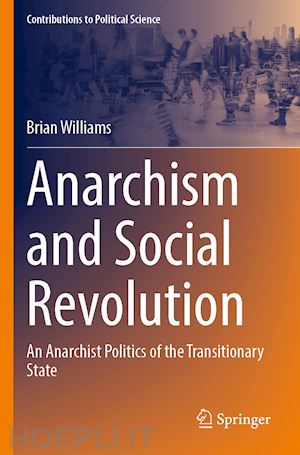
Questo prodotto usufruisce delle SPEDIZIONI GRATIS
selezionando l'opzione Corriere Veloce in fase di ordine.
Pagabile anche con Carta della cultura giovani e del merito, 18App Bonus Cultura e Carta del Docente
This monograph provides an update to anarchist philosophy, advocating for a paradigm shift beyond neoliberalism and liberal democracy. The book’s central thesis has two components. First, it is argued that the maximization of equal liberty requires historical progress beyond the sovereign state system. In contrast to Fukuyama’s (1992) argument that liberal democracy is the end of history, it is argued that liberalism contains two contradictions (socioeconomic inequality and the shortcoming in equal liberty inherent to state power) with the potential to propel history further. This book’s argument – libertarian social democracy – provides a framework to guide that final stage of history.
Second, while anarchist philosophy offers a vision beyond the sovereign state, it can be rendered more suitable as an alternative paradigm. Specifically, it is argued that anarchism is hampered by its traditional adherence to prefigurative strategy, according towhich the state cannot be used as a means to achieve a free and equal society. By contrast, libertarian social democracy incorporates a role for a democratic transitionary state (described here as gradualist anarchism) thus addressing mainstream “Hobbesian” concerns about bad anarchy (where decentralization yields a net loss in equal liberty). In so doing, the book reveals the full spectrum of anarchist strategy from prefigurative to gradualist.
Preface.- Introduction.- Part I: Anarchism.- Chapter 1: Anarchism in the Political Realm.- Chapter 2: Anarchism in the Economic Realm.- Chapter 3: Anarchism in the Cultural Realm.- Part II: Social Revolution.- Chapter 4: An Elite Theory of United States Politics.- Chapter 5: The Political Landscape.- Chapter 6: Revolutionary Objectives.- Chapter 7: Revolutionary Strategy.- Conclusion-Works Cited.- Index.
Brian Williams is Assistant Professor in the Department of Political Science at SUNY Cortland (US) where he teaches classes in political research methods, comparative politics, and international relations. His recent empirical research has focused on direct democracy and voter turnout, electoral connection and private member bill proposals, as well as coalition agreements and intra-party unity. In the area of political philosophy, his recent writing has examined the interrelationship between anarchism and democracy. His work has been published in The Social Science Journal, Representation, Political Science Research and Methods, Theory in Action, and Legislative Studies Quarterly.











Il sito utilizza cookie ed altri strumenti di tracciamento che raccolgono informazioni dal dispositivo dell’utente. Oltre ai cookie tecnici ed analitici aggregati, strettamente necessari per il funzionamento di questo sito web, previo consenso dell’utente possono essere installati cookie di profilazione e marketing e cookie dei social media. Cliccando su “Accetto tutti i cookie” saranno attivate tutte le categorie di cookie. Per accettare solo deterninate categorie di cookie, cliccare invece su “Impostazioni cookie”. Chiudendo il banner o continuando a navigare saranno installati solo cookie tecnici. Per maggiori dettagli, consultare la Cookie Policy.